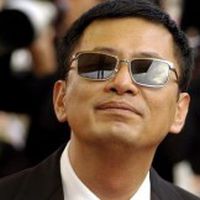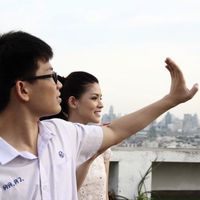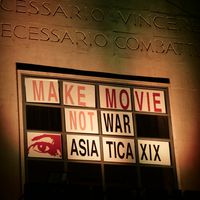Waiting For Wong Kar Wai
"We're waiting for Wong Kar Wai," said the chirpy volunteer at the airport. Have you seen any of his films? I asked. "No," she replied, but pointed to one of the still images of Tony Leung embracing Zhang Ziyi from “2046” that decorated the booth for the Bangkok International Film Festival, “but that is his film.”
Now in it’s third year, the Bangkok International Film Festival is still trying to find its niche in an overcrowded schedule of film festivals worldwide. The programme is bigger and the selection wider, but some of the films are typical Hollywood dreck, such as “Elektra”. Opening night festivities had been toned down in the wake of the recent tsunami disaster, and proceeds from the screenings go towards victims in affected areas. Thankfully, this did not result in the festival being canceled, and the festival was quite a success, despite some rough edges.
Wong Kar Wai could not make it for the benefit screening as he was ill, but he turned up on Friday for a press conference on “2046”. The statuesque director handled the press deftly, even as the flamboyant Bai Ling hid behind a screen and fawned over the director’s work, hoping that she would have the chance to work with him. Wong Kar Wai started off his conference with much praise about the Bangkok Film industry. After all, he had shot, processed and edited parts of his film there. It gave the extra stamp of legitimacy for a festival still finding its footing.
After all, the Bangkok’s festival biggest selling point might be the burgeoning Thai film industry. Last year saw almost 50 Thai films being produced when in 2001 there were only 13. With mainstream hit “Ong Bak: Muay Thai Warrior” and Cannes prize winner “Tropical Malady” fulfilling both ends of the box-office and arthouse spectrum, Thai films have been making their mark. However, this does not mean that the industry is quite mature yet. Some of the other Thai offerings on show at the festival were mediocre, but it is not hard to envision the day when Thai directors are spoken of in the same breath as Korean directors today.
Undoubtedly, the festival appears to be at the same stage as the Pusan Film Festival, which has quickly become one of the most important Asian Film Festivals in a short span of time, helped by the quickly growing local film industry.
The slams against the festival include the location of the theaters, which are far apart. While there’s ample time to take the Skytrain between venues, locating the cinema within the labyrinth-like malls often turned into a nightmare, particularly if it was one’s first trip to the venue. With the subway closed that week after an accident, navigating Bangkok was made even worse. The festival map in the programme was also confusing. Many screenings were often sparsely filled, such as the screening of “Electric Shadows”, a Chinese film lauded by Time magazine as one of the best of 2004, where the audience barely numbered 20.
Even worse, most screenings did not have Thai subtitles, which meant most locals would not be able to understand the films. For a festival in its third year, it is a glaring oversight.
However, it was not all brickbats. There were no complaints about the seats themselves. The theaters were comfortable and seating, and the volunteers manning the booths were helpful and quite knowledgeable. Tickets were cheap at 80 baht and 120 baht, though obtaining tickets frequently resulted in long queues.
The programming was also questionable, and at best, conservative. Film festival favourites such as “Clean” and “Vera Drake” were screened next to Hollywood mainstream blockbusters such as “Elektra”, “After the Sunset” and “The Notebook”. A Lifetime Achievement Award was given to Joel Schumacher, where the programme unabashedly calls him ‘The God of Filmmaking” There was little focus to many of the screenings, but with four screening times a day and up to six films being shown at the same time, even the most hardcore film fanatic would have been satisfied.
The festival’s hodgepodge of activities, aimed at film professionals, certainly gain attention. The Cinematographer’s Day had Christopher Doyle, Eric Gautier, Rodrigo Prieto and others holding court, with the ever quotable Doyle chairing a discussion on Sex and the Camera. For those attending the film markets, there was a load of activities including power breakfast meetings, film financing seminars and Troma founder Lloyd Kaufman telling attendees to ‘Make Their Own Damn Film’.
Notable films screened included the Hungarian subway thriller-comedy “Kontroll”, Mike Leigh’s deft character study “Vera Drake”, the Oscar-winning documentary “Born Into Brothels”, Patrice LeConte’s meditation on Cambodia “Dogora”, the kinetic Thai martial arts fest “Born to Fight” and Wisit Sasanatieng’s “Citizen Dog”.
As it is, the Bangkok Film Festival appears to still finding an identity. While some might scoff at the festival’s all-out courtship of celebrity, the BKIFF is a child eager to go far. It is a long way off from becoming one of the elite film festivals in Asia, let alone the world, but Pusan took less than a decade to get there. With the excitement of the Thai film industry behind it, the Bangkok Film Festival is a festival worth checking out.
The Golden Kinnaree winners were: "The Sea Inside" (best film), Christophe Barratier for "Les Choristes" and Park Chan-Wook for "Old Boy" (tie, best director), Javier Bardem for "The Sea Inside" (best actor), Annette Bening for "Being Julia" and Ana Geislerova for "Zelary" (best actress), James Lee’s "The Beautiful Washing Machine" (best ASEAN film), "Born into Brothels" (best documentary), "Touch the Sound" and "Final Solution" (doc special mentions), Bharatbala for "Hari Om" (New Voices award), and the late Thai director Vichit Kounavudhi (lifetime achievement).
About the writer:
Dave Chua is the programming manager for the Singapore Film Society and the Festival Director for Animation Nation.




